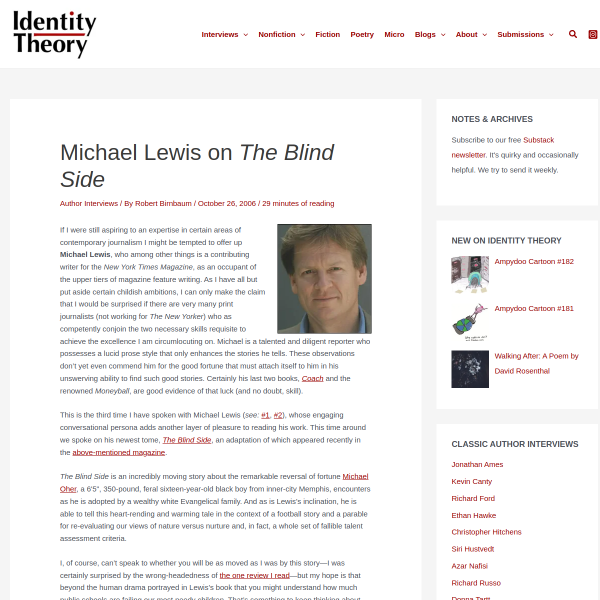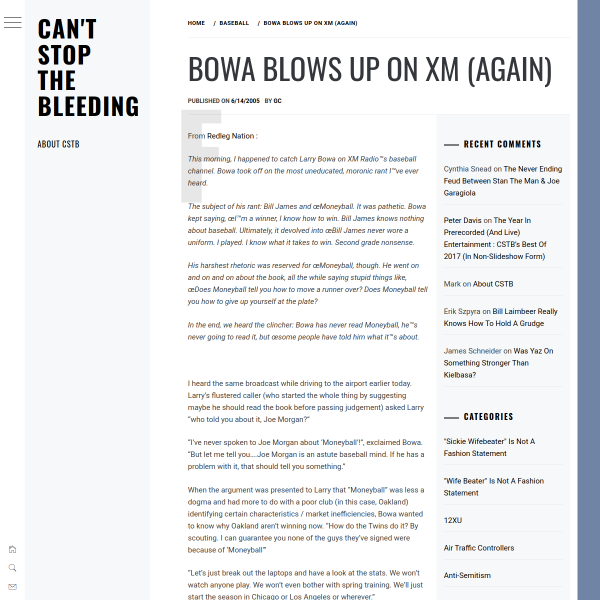Another overheard conversation on the bus. This was more of a monologue, a girl in her very early twenties talking about a guy she met at a party. She related to her girlfriends how she and and the guy had "crashed at Cassandra's place", and that the couch was shaped in such a way as to discourage cuddling—any couch that is designed in such a way to discourage cuddling is a crime against nature—ƒand that they had talked for hours and when they woke up, talked for 4 hours in the morning. The remarkable part, for me, is not that they had such a long conversation: I've had such long conversations, some that lasted well in to the morning. One lasted up until 5 AM. I felt kind of bad for one of my friends who was part of that conversation, because he really wanted to get alone with one of the girls also in the conversation group. It was all good though: at a party later, they got to second-base-or-so.
No, the remarkable part was that this was the first time that I heard a recap and evaluation from the girl's side of the story. She talked about how he was not especially good-looking, but that from their long conversation she found out much about him that she had in common, and even discovered that he was studying journalism and was into sports and that maybe he would become a sports columnist because that was "more accessible". (The best political columnists start out as sports columnists, a wit once wrote. Watching sports you have to suspend belief for 2 1/2 hours at a time and then write about it. Watching politics, you have to suspend belief full-time.) She said that because of that conversation, she figured out that she could find out whether a guy was more than just good-looking—that is, that there is a brain behind the body—if she asked him what book he was reading. She figured if he had an answer—any answer—other than "nothing", she could better determine whether he was a smart guy or not was not. Their conversation moved on to other guys they knew, including a "hot British guy" who could evidently could also speak French and Spanish. "Yeah," I wanted to ask them, but what book had he just read?"
A few months ago, I showed up to a party wearing a t-shirt and jeans and whatever else I was wearing that day. It was a spur-of-the-moment invitation, and I had planned to do nothing that night but sit in front of a cathode ray tube chatting with people I will never meet in the flesh. I decided it would be an opportunity to see a few friends I hadn't seen in a while. After politely declining alcoholic drinks, and impolitely accepting cookies in the shape of the female reproductive organs, I sat down and proceeded to mind my own business when a relatively cute Asian girl started, for reasons known only to her, talking to me. She saw my T-shirt and I explained it, and then she asked what I did for a living, to which I said that I was an independent contractor doing tech support for an Internet hosting company, a little bit of script programming, setting up websites and some other impressive-sounding tech-related phrase. She then asked, as if she were genuinely interested, what book I had last read. I lied and said Moneyball by Michael Lewis, because it was far more interesting than the book I had really last read, and proceeded to explain what the book was about. The question caught me a little off-guard—not so off-guard that I couldn't deftly think of an interesting lie, mind you—;for the very simple reason that no remotely attractive member of either sex has asked me at a party what book I last read, especially not in the drunken state he or she was in. Those who have skipped ahead here or those who have actually read up to this point may be wondering if I got her phone number. I can be confident and funny when I'm tired, but not confidence only goes so far when a girl's sober significant other is sitting next to her. If I had business cards at that point, or if I had been working for the employer that currently has yet to provide me with them, I would have handed it to her. Since both conditionals on which that last sentence is based is false, it naturally follows that the ritual conversation-concluding exchange of business cards did not occur.
Inner cinema now takes over as I consider the possibilities: what if I had a business card that night to give out? What if Mr. I Should Probably Be Taking My Girlfriend Home Now wasn't sitting next to her when I was not only not giving a fuck but sounding relatively coherent and intelligent in the presence a good-looking, about-my-age and single-for-all-I-know woman? Although surely there is more than one reason a woman would want to know what book the person sitting next to her has just read, overhearing that conversation on the bus fills in a spot on that list, which is, to see whether the individual in question might be thinking about things other than how to get in their pants.




